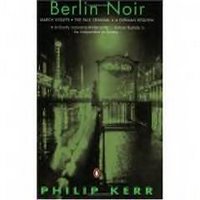Life during wartime
I've just picked up Dan Fesperman's Lie in the Dark, published in 1999 and featuring Vlado Patric, a homicide investigator in wartime Sarajevo. The opening pages offer an eerie description of daytime calm in a war zone, and an unexpectedly testy confrontation between the coffee-deprived Patric and a speechifying reporter.
"I think you are oversimplifying a complex situation," Patric tells the reporter, who replies: "Yes, well that's what I'm paid for, isn't it. Take all the nice blurry grays and turn them into black and white for the public to digest before moving onto the horoscopes and the latest from the Royals." (The reporter's preachiness and self-pity are interesting, considering that Fesperman is himself a reporter who covered Bosnia-Herzegovina, Croatia and Serbia during the Balkan wars of the 1990s, according to the book's author information.)
I am guessing that this somewhat uneasy opening is Fesperman's way of dealing with the special problems of setting a murder mystery in a war zone. It reminds me of the uneasy self-justification J. Robert Janes offers at the beginning of each of his St. Cyr-Kohler novels, about a French detective and a Gestapo investigator who team up to solve crimes in Nazi-occupied France:
I do not condone what happened during these times, I abhor it. But during the Occupation of France the everyday crimes of murder and arson continued to be committed, and I merely ask, by whom and how were they solved?
 Yasmina Khadra's Brahim Llob novels and Philip Kerr's Berlin Noir trilogy handle the task more smoothly. Khadra integrates the horror and tension of 1990s Algiers into his first-person narrator-protagonist's everyday activities and observations. Kerr does something similar, plunging his blunt, wise-cracking protagonist directly into the action and offering wry observations about all that surrounds him, including noxious signs of Nazi terror. The observations are all the more striking for their off-handedness. No need for self-justification here.
Yasmina Khadra's Brahim Llob novels and Philip Kerr's Berlin Noir trilogy handle the task more smoothly. Khadra integrates the horror and tension of 1990s Algiers into his first-person narrator-protagonist's everyday activities and observations. Kerr does something similar, plunging his blunt, wise-cracking protagonist directly into the action and offering wry observations about all that surrounds him, including noxious signs of Nazi terror. The observations are all the more striking for their off-handedness. No need for self-justification here.
© Peter Rozovsky 2006
"I think you are oversimplifying a complex situation," Patric tells the reporter, who replies: "Yes, well that's what I'm paid for, isn't it. Take all the nice blurry grays and turn them into black and white for the public to digest before moving onto the horoscopes and the latest from the Royals." (The reporter's preachiness and self-pity are interesting, considering that Fesperman is himself a reporter who covered Bosnia-Herzegovina, Croatia and Serbia during the Balkan wars of the 1990s, according to the book's author information.)
I am guessing that this somewhat uneasy opening is Fesperman's way of dealing with the special problems of setting a murder mystery in a war zone. It reminds me of the uneasy self-justification J. Robert Janes offers at the beginning of each of his St. Cyr-Kohler novels, about a French detective and a Gestapo investigator who team up to solve crimes in Nazi-occupied France:
I do not condone what happened during these times, I abhor it. But during the Occupation of France the everyday crimes of murder and arson continued to be committed, and I merely ask, by whom and how were they solved?
 Yasmina Khadra's Brahim Llob novels and Philip Kerr's Berlin Noir trilogy handle the task more smoothly. Khadra integrates the horror and tension of 1990s Algiers into his first-person narrator-protagonist's everyday activities and observations. Kerr does something similar, plunging his blunt, wise-cracking protagonist directly into the action and offering wry observations about all that surrounds him, including noxious signs of Nazi terror. The observations are all the more striking for their off-handedness. No need for self-justification here.
Yasmina Khadra's Brahim Llob novels and Philip Kerr's Berlin Noir trilogy handle the task more smoothly. Khadra integrates the horror and tension of 1990s Algiers into his first-person narrator-protagonist's everyday activities and observations. Kerr does something similar, plunging his blunt, wise-cracking protagonist directly into the action and offering wry observations about all that surrounds him, including noxious signs of Nazi terror. The observations are all the more striking for their off-handedness. No need for self-justification here.© Peter Rozovsky 2006
Labels: Brahim Llob, Dan Fesperman, J. Robert Janes, Philip Kerr, War, Yasmina Khadra

0 Comments:
Post a Comment
<< Home